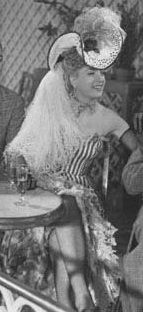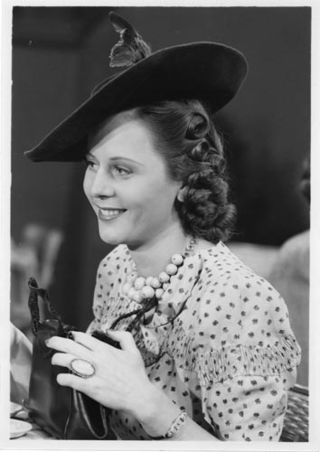
Mecha Ortiz was a classic Argentine actress who appeared in films between 1937 and 1981, during the Golden Age of Argentine Cinema. At the 1944 Argentine Film Critics Association Awards, Ortiz won the Silver Condor Award for Best Actress for her performance in Safo, historia de una pasión (1943), and won it again in 1946 for her performance in El canto del cisne (1945). She was known as the Argentine Greta Garbo and for playing mysterious characters, who suffered by past misfortunes in love, mental disorders, or forbidden love. Safo, historia de una pasión was the first erotic Argentine film, though there was no nudity. She also played in the first film in which a woman struck a man and the first film with a lesbian romance. In 1981, she was awarded the Grand Prize for actresses from the National Endowment for the Arts.
La Amada Inmóvil is a 1945 Argentine film directed and written by Luis Bayón Herrera. The film starred Santiago Gómez Cou and Yvonne Bastien as Ivonne De Lys. The film was based on the poem La Amada Inmóvil , written by Amado Nervo and published in 1922.

Help Me to Live is a 1936 Argentine romantic drama musical directed and written by José A. Ferreyra with Libertad Lamarque. Starring Libertad Lamarque and Santiago Gómez Cou, the film premiered on 26 August 1936 in Buenos Aires.

Asalto a la ciudad is a 1968 Argentine black and white crime film directed and written by Carlos Cores who also starred with Santiago Gómez Cou and Olga Zubarry. The film premiered on 3 March 1968 in Buenos Aires. The film is based upon a crime novel.

Julio Saraceni was a prolific Argentine film director whose career in the Cinema of Argentina as a movie director spanned six decades.
The Journey is a 1942 Argentine film directed by Francisco Múgica.

The Marihuana Story is a 1950 Argentine film directed by León Klimovsky. It was entered into the 1951 Cannes Film Festival.
Deshonra is a 1952 Argentine film directed by Daniel Tinayre, who was also one of the co-writers. It was the first portrayal of a lesbian love affair.
El Grito sagrado is a 1954 Argentine historical film, directed by Luis César Amadori, who co-wrote with Pedro Miguel Obligado, and starring Fanny Navarro, Carlos Cores and Aída Luz.
Campo arado is a 1959 Argentine film.
Emergency Ward is a 1952 Argentine film directed by Tulio Demicheli. It was entered into the 1953 Cannes Film Festival.

Catita es una dama is a 1956 Argentine comedy film directed by Julio Saraceni and starring Niní Marshall.
Perla is a Mexican telenovela produced by TV Azteca and starred Silvia Navarro and Leonardo Garcia as protagonists.

Margot Abad was an Argentine film actress during the golden age of Argentine cinema. She performed with Luis Sandrini, Santiago Gómez Cou, Olinda Bozán, Vicente Rubino, Lolita Torres, and Héctor Quintanilla.

A Woman of No Importance is a 1945 Argentine comedy drama film directed by Luis Bayón Herrera and starring Mecha Ortiz, Santiago Gómez Cou, Golde Flami. The film is based on Oscar Wilde's 1894 play A Woman of No Importance with the action moved from London to Córdoba in central Argentina.
Te amo is a Mexican telenovela produced by Guillermo Diazayas and directed by Enrique Segoviano for Televisa in 1984. It starred Lourdes Munguía, José Roberto, Aarón Hernán, María Rubio and Norma Lazareno.
Story of a Poor Young Man is a 1942 Argentine historical drama film directed by Luis Bayón Herrera and starring Hugo del Carril, Santiago Gómez Cou and Nélida Bilbao. It is based on the 1858 French novel of the same title by Octave Feuillet, which was later adapted again in 1968. The film's sets were designed by Juan Manuel Concado. It was released during what is considered to be the Golden Age of Argentine Cinema.

Aída Luz was an Argentine actress who primarily worked during the Golden Age of Argentine Cinema, performing on both stage and in films. She won multiple awards for her performances including the Martín Fierro Awards, the ACE de Oro, the Premios Estrella de Mar and the Golden Condor from the Argentine Film Critics Association.

The Desire is a 1944 Argentine drama film directed by Carlos Schlieper and starring Elsa O'Connor, Aída Luz and Roberto Airaldi. The film's sets were designed by the art director Juan Manuel Concado.

Fanny Navarro was an Argentine actress. She starred in films such as Melodías porteñas (1937), Doce mujeres (1939), Ambición (1939), El hijo del barrio (1940), Hogar, dulce hogar (1941), Dos ángeles y un pecador (1945), Marihuana (1950), Deshonra (1952), Marta Ferrari (1956) and La Calesita (1969). Navarro was the girlfriend of Eva Perón's brother, and she was selected by Perón to head the Peronist foundation for actresses. Navarro once lost the only copy of a script written for Leopoldo Marechal's play Antigona Verez; Marechal was ordered to rewrite the entire thing.











